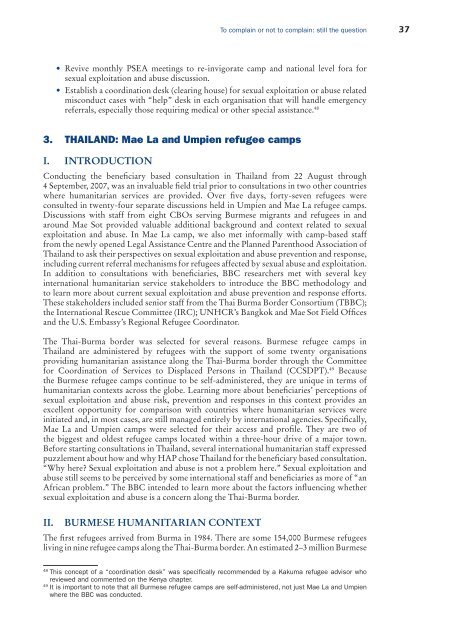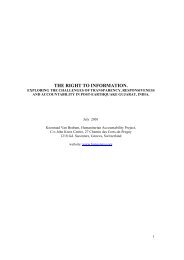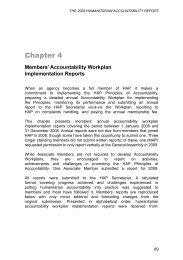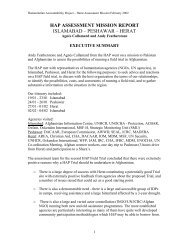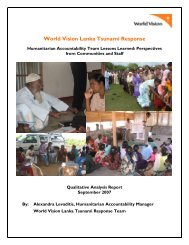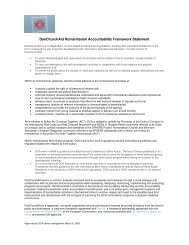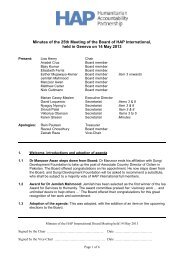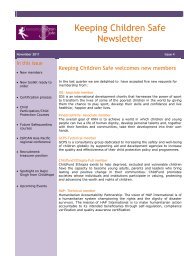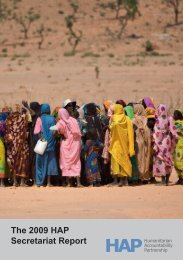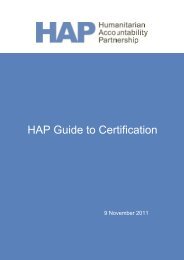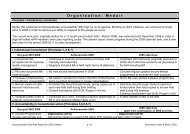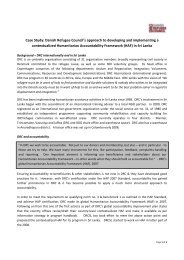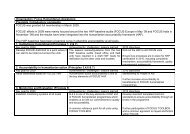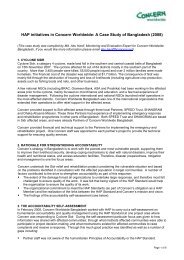TO COMPLAIN OR NOT TO COMPLAIN: STILL THE QUESTION ...
TO COMPLAIN OR NOT TO COMPLAIN: STILL THE QUESTION ...
TO COMPLAIN OR NOT TO COMPLAIN: STILL THE QUESTION ...
Create successful ePaper yourself
Turn your PDF publications into a flip-book with our unique Google optimized e-Paper software.
To complain or not to complain: still the question<br />
37<br />
• Revive monthly PSEA meetings to re-invigorate camp and national level fora for<br />
sexual exploitation and abuse discussion.<br />
• Establish a coordination desk (clearing house) for sexual exploitation or abuse related<br />
misconduct cases with “help” desk in each organisation that will handle emergency<br />
referrals, especially those requiring medical or other special assistance. 48<br />
3. THAILAND: Mae La and Umpien refugee camps<br />
I. INTRODUCTION<br />
Conducting the beneficiary based consultation in Thailand from 22 August through<br />
4 September, 2007, was an invaluable field trial prior to consultations in two other countries<br />
where humanitarian services are provided. Over five days, forty-seven refugees were<br />
consulted in twenty-four separate discussions held in Umpien and Mae La refugee camps.<br />
Discussions with staff from eight CBOs serving Burmese migrants and refugees in and<br />
around Mae Sot provided valuable additional background and context related to sexual<br />
exploitation and abuse. In Mae La camp, we also met informally with camp-based staff<br />
from the newly opened Legal Assistance Centre and the Planned Parenthood Association of<br />
Thailand to ask their perspectives on sexual exploitation and abuse prevention and response,<br />
including current referral mechanisms for refugees affected by sexual abuse and exploitation.<br />
In addition to consultations with beneficiaries, BBC researchers met with several key<br />
international humanitarian service stakeholders to introduce the BBC methodology and<br />
to learn more about current sexual exploitation and abuse prevention and response efforts.<br />
These stakeholders included senior staff from the Thai Burma Border Consortium (TBBC);<br />
the International Rescue Committee (IRC); UNHCR’s Bangkok and Mae Sot Field Offices<br />
and the U.S. Embassy’s Regional Refugee Coordinator.<br />
The Thai-Burma border was selected for several reasons. Burmese refugee camps in<br />
Thailand are administered by refugees with the support of some twenty organisations<br />
providing humanitarian assistance along the Thai-Burma border through the Committee<br />
for Coordination of Services to Displaced Persons in Thailand (CCSDPT). 49 Because<br />
the Burmese refugee camps continue to be self-administered, they are unique in terms of<br />
humanitarian contexts across the globe. Learning more about beneficiaries’ perceptions of<br />
sexual exploitation and abuse risk, prevention and responses in this context provides an<br />
excellent opportunity for comparison with countries where humanitarian services were<br />
initiated and, in most cases, are still managed entirely by international agencies. Specifically,<br />
Mae La and Umpien camps were selected for their access and profile. They are two of<br />
the biggest and oldest refugee camps located within a three-hour drive of a major town.<br />
Before starting consultations in Thailand, several international humanitarian staff expressed<br />
puzzlement about how and why HAP chose Thailand for the beneficiary based consultation.<br />
“Why here? Sexual exploitation and abuse is not a problem here.” Sexual exploitation and<br />
abuse still seems to be perceived by some international staff and beneficiaries as more of “an<br />
African problem.” The BBC intended to learn more about the factors influencing whether<br />
sexual exploitation and abuse is a concern along the Thai-Burma border.<br />
II.<br />
BURMESE HUMANITARIAN CONTEXT<br />
The first refugees arrived from Burma in 1984. There are some 154,000 Burmese refugees<br />
living in nine refugee camps along the Thai-Burma border. An estimated 2–3 million Burmese<br />
48<br />
This concept of a “coordination desk” was specifi cally recommended by a Kakuma refugee advisor who<br />
reviewed and commented on the Kenya chapter.<br />
49<br />
It is important to note that all Burmese refugee camps are self-administered, not just Mae La and Umpien<br />
where the BBC was conducted.


